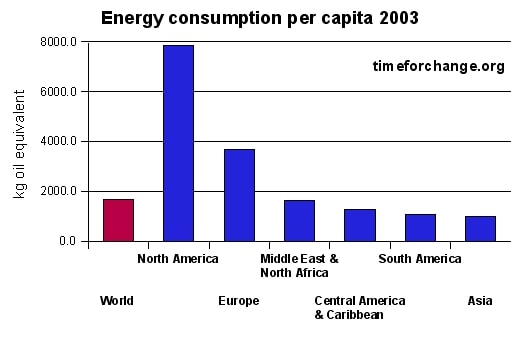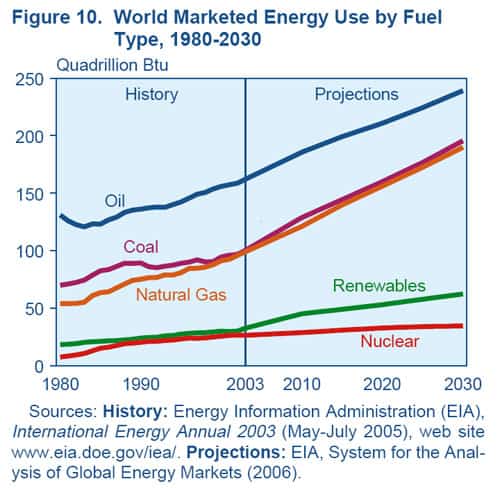How much energy will we consume in the future?
According to the American Energy Information Administration (EIA) and to the International Energy Agency (IEA), the world-wide energy consumption will on average continue to increase by 2% per year. The graph below shows the actual values starting from 1980 until today in blue and the predictions of the energy consumption until the year 2030 in orange.
A yearly increase by 2% leads to a doubling of the energy consumption every 35 years. This means the world-wide energy consumption is predicted to be twice as high in the year 2040 compared to today (2007).

More detailed data (in quadrillion BTU) of the actual and predicted energy consumption world-wide by geographic area:
| Region | 2003 | 2010 | 2015 | 2020 | 2025 | 2030 | Average Annual Percent Change, 2003-2030 |
|---|---|---|---|---|---|---|---|
| OECD | 234.3 | 256.1 | 269.9 | 281.6 | 294.5 | 308.8 | 1.0 |
| North America | 118.3 | 131.4 | 139.9 | 148.4 | 157.0 | 166.2 | 1.3 |
| Europe | 78.9 | 84.4 | 87.2 | 88.7 | 91.3 | 94.5 | 0.7 |
| Asia | 37.1 | 40.3 | 42.8 | 44.4 | 46.1 | 48.0 | 1.0 |
| Non-OECD | 186.4 | 253.6 | 293.5 | 331.5 | 371.0 | 412.8 | 3.0 |
| Europe and Eurasia | 48.5 | 56.5 | 62.8 | 68.7 | 74.0 | 79.0 | 1.8 |
| Asia | 83.1 | 126.2 | 149.4 | 172.8 | 197.1 | 223.6 | 3.7 |
| Middle East | 19.6 | 25.0 | 28.2 | 31.2 | 34.3 | 37.7 | 2.4 |
| Africa | 13.3 | 17.7 | 20.5 | 22.3 | 24.3 | 26.8 | 2.6 |
| Central and South America | 21.9 | 28.2 | 32.5 | 36.5 | 41.2 | 45.7 | 2.8 |
| Total World | 420.7 | 509.7 | 563.4 | 613.0 | 665.4 | 721.6 | 2.0 |
The highest annual growth of energy consumption is predicted for Asia (3.7%), NON-OECD countries (3%) and Central and South America (2.8%). The lowest annual growth of energy consumption is predicted for Europe with 1%.
Current energy consumption by capita
The values are indicated as "kg oil equivalents" or kgoe. An example from the graph: People living in North America use per year and per person the energy equivalent to approx. 8'000 kg oil, which is about 10'000 litres of oil. To convert "kg oil equivalent" into kWh, multiply it with the factor 11.628. Example: 8'000 kg oil is about 93'024 kWh (11.628 x 8'000) or 93 MWh.
There are huge differences between individual regions of the world.


Data has been extracted from Earthtrends.wri.org , an excellent, very flexible source of data. This site is recommended if you want to go into more details.
With respect to global warming, it is important to know how much fossil fuels are being used. Fossil fuels are converted into water and carbon dioxide when they are burnt in heatings, cars, air planes, etc. Carbon dioxide is a greenhouse gas and as such the most important cause for global warming.

World-wide, about 80% of all energy used is currently from fossil fuels.
In order to mitigate global warming, it is inevitable to reduce the quantity of fossil fuels consumed as much as possible. As already shown further above, the world-wide energy consumption is predicted to double again within the next 35 years.
Let's therefore have a look at the predicted energy consumptions by energy source:
Future sources of energy (predictions by fuel types)
In particular with respect to the emission of greenhouse gases and global warming, it is interesting to study the predicted growth of energy consumption by fuel type. See graph below (again from EIA)

By far the highest increase in world-wide energy consumption is predicted to be from all three fossil fuels: oil, coal and natural gas! The renewable energies are predicted to grow as well, but much less than fossil energies. Nuclear energy is predicted to grow relatively moderate.
Instead of a reduction, the data from EIA and IEA predict a massive increase of the consumption of fossil fuels. According to the above chart, even the share of fossil fuels will increase further, to more than 80%! The consumption of fossil fuels is predicted to be twice as high already in the year 2020 compared to today's consumption.
We have a serious problem
It is only possible to mitigate global warming if the world-wide consumption of fossil fuels can be drastically reduced in the next 10 to 15 years. There is simply no room for a scenario as it is predicted by the International Energy Agency IEA (see chart above).
It is also obvious that no combination of alternative technologies can replace the current usage of fossil fuels. There is simply not enough non-fossil fuel available for this. In order to mitigate global warming, we have to use the available energy much more efficiently. But this won't be enough either: We will have to change our behaviour to reduce our personal energy consumption. We must change our current live style and seriously strive for a sustainable living.
Energy consumption per capita for the top energy consumers
Here is an update of the energy consumption per capita and for the predicted energy consumption for the top energy consuming countries:
Source: http://EarthTrends.org , 2008
Carly
Thanks for information
Canon Drivers
Peak oil
I dont think the Projection for Oil and Natural gas will happen. We do have the oil peak now and that will have profound effects on ower way of life. And it will be a challenge to reduce CO2 because we will have less money and energy to change our energysystem.
Spellings
You spelt behavior wrong.
behavior
time for a little grammar: http://en.wikipedia.org/wiki/Behavior
Spelled
You spelled spelled wrong.
http://en.wikipedia.org/wiki/Spelt
You’re all idiots
You’re all idiots
Please do NOT use that
Please do NOT use that language on a public forum…
Carlos
Thanks for information
Canon Drivers
Comments are closed.